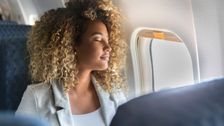Earlier this year, TikTok user FindingFiona uploaded a travel video that got serious attention, garnering more than 2 million views and 1,000 comments. In the post, she emphasized the importance of wearing sunscreen on flights, citing reports of people incurring more sun damage when they’re at higher altitudes.
“Even though you’re inside the aircraft, because of the high altitudes, you’re actually experiencing stronger UV radiation, especially if you’re in the window seat,” she says in the video.
According to dermatologists, the TikToker’s claim is partially correct — but it’s also a little wrong. “The good news is that the true risk from one flight, or somebody who flies occasionally, is probably low,” said Dr. Elizabeth Jones, an assistant professor of dermatology at Thomas Jefferson University Hospital in Philadelphia.
But Jones noted that for flight crew members and pilots, the risk is higher. “People who are flying occupationally, they’re going to be exposed much more to ultraviolet light given — especially, if they’re in the cockpit — the size of the windshield,” and given all the time they spend at a higher altitude, she said.
Jones pointed to a 2015 study that found pilots and cabin crew have roughly twice the incidence of melanoma, a less common but more serious form of skin cancer, when compared to the general population.
So, there is a connection between flying and sun damage. Below, dermatologists explain what you should know about your sun damage risk when you’re at cruising altitude.
Airplane windows block out most UVB rays, but not all UVA rays.
“Airplane windows effectively block out most of the UVB rays,” Jones said, referring to the rays that can cause sunburn and skin cancer. So even if you’re sitting in the window seat, you likely won’t end up with sunburn after a flight. But that doesn’t mean other damage can’t occur.
This is also true for non-airplane windows, said Dr. Jennifer Holman, a dermatologist with U.S. Dermatology Partners Tyler in Texas. “Most typical windows in a house or a car are going to filter out … like 97%, 98% of the UVB radiation, which is typically the wavelength that people think of that causes sunburns,” she said.
While windows block these rays, they don’t block all rays. According to Jones, airplane windows don’t fully keep out UVA rays, which can “cause premature aging, wrinkles and ultimately can contribute to skin cancer as well.” (Jones did note,…
Click Here to Read the Full Original Article at Travel – Top Destinations, Vacation Ideas…
